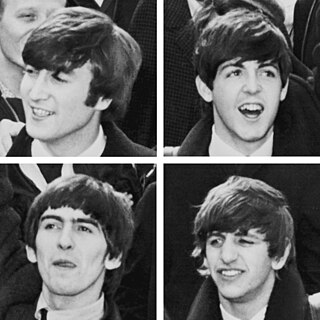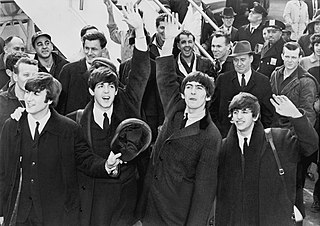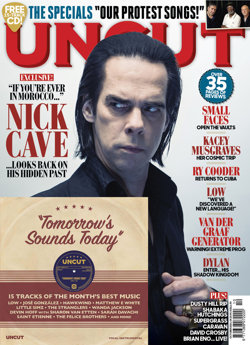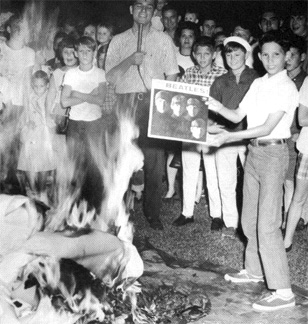Related Research Articles
A boy band is loosely defined as a vocal group consisting of young male singers, usually in their teenage years or in their twenties at the time of formation. Generally, boy bands perform love songs marketed towards girls and young women. Many boy bands dance as well as sing, usually giving highly choreographed performances. South Korean boy bands usually also have designated rappers.

The Beatles were an English rock band formed in Liverpool in 1960, comprising John Lennon, Paul McCartney, George Harrison and Ringo Starr. They are regarded as the most influential band of all time and were integral to the development of 1960s counterculture and the recognition of popular music as an art form. Rooted in skiffle, beat, and 1950s rock 'n' roll, their sound incorporated elements of classical music and traditional pop in innovative ways. The band also explored music styles ranging from folk and Indian music to psychedelia and hard rock. As pioneers in recording, songwriting and artistic presentation, the Beatles revolutionised many aspects of the music industry and were often publicised as leaders of the era's youth and sociocultural movements.

Sgt. Pepper's Lonely Hearts Club Band is the eighth studio album by the English rock band the Beatles. Released on 26 May 1967, Sgt. Pepper is regarded by musicologists as an early concept album that advanced the roles of sound composition, extended form, psychedelic imagery, record sleeves, and the producer in popular music. The album had an immediate cross-generational impact and was associated with numerous touchstones of the era's youth culture, such as fashion, drugs, mysticism, and a sense of optimism and empowerment. Critics lauded the album for its innovations in songwriting, production and graphic design, for bridging a cultural divide between popular music and high art, and for reflecting the interests of contemporary youth and the counterculture.

The British Invasion was a cultural phenomenon of the mid-1960s, when rock and pop music acts from the United Kingdom and other aspects of British culture became popular in the United States with significant influence on the rising "counterculture" on both sides of the Atlantic Ocean. UK pop and rock groups such as the Beatles, the Rolling Stones, the Who, the Kinks, the Zombies, Small Faces, the Pretty Things, the Dave Clark Five, The Spencer Davis Group, Herman's Hermits, the Hollies, the Animals, Gerry and the Pacemakers, the Searchers, the Yardbirds, and Them, as well as solo singers such as Dusty Springfield, Cilla Black, Petula Clark, Tom Jones and Donovan, were at the forefront of the "invasion".
Power pop is a subgenre of rock music and a form of pop rock based on the early music of bands such as the Who, the Beatles, the Beach Boys, and the Byrds. It typically incorporates melodic hooks, vocal harmonies, an energetic performance, and cheerful sounding music underpinned by a sense of yearning, longing, despair, or self-empowerment. The sound is primarily rooted in pop and rock traditions of the early-to-mid 1960s, although some artists have occasionally drawn from later styles such as punk, new wave, glam rock, pub rock, college rock, and neo-psychedelia.

The English rock band the Beatles, comprising John Lennon, Paul McCartney, George Harrison and Ringo Starr, are commonly regarded as the foremost and most influential band in popular music history. They sparked the "Beatlemania" phenomenon in 1963, gained international superstardom in 1964, and remained active until their break-up in 1970. Over the latter half of the decade, they were often viewed as orchestrators of society's developments. Their recognition concerns their effect on the era's youth and counterculture, British identity, popular music's evolution into an art form, and their unprecedented following.

Music journalism is media criticism and reporting about music topics, including popular music, classical music, and traditional music. Journalists began writing about music in the eighteenth century, providing commentary on what is now regarded as classical music. In the 1960s, music journalism began more prominently covering popular music like rock and pop after the breakthrough of The Beatles. With the rise of the internet in the 2000s, music criticism developed an increasingly large online presence with music bloggers, aspiring music critics, and established critics supplementing print media online. Music journalism today includes reviews of songs, albums and live concerts, profiles of recording artists, and reporting of artist news and music events.
The Billboard 200 is a record chart ranking the 200 most popular music albums and EPs in the United States. It is published weekly by Billboard magazine to convey the popularity of an artist or groups of artists. Sometimes, a recording act is remembered for its "number ones" that outperformed all other albums during at least one week. The chart grew from a weekly top 10 list in 1956 to become a top 200 list in May 1967, acquiring its existing name in March 1992. Its previous names include the Billboard Top LPs (1961–1972), Billboard Top LPs & Tape (1972–1984), Billboard Top 200 Albums (1984–1985) and Billboard Top Pop Albums (1985–1992).

Abbey Road is the eleventh studio album by the English rock band the Beatles, released on 26 September 1969. It is the last album the group recorded, although Let It Be was the last album completed before the band's break-up in April 1970. It was mostly recorded in April, July, and August 1969, and topped the record charts in both the United States and the United Kingdom. A double A-side single from the album, "Something" / "Come Together", was released in October, which also topped the charts in the US.

Uncut is a monthly magazine based in London. It is available across the English-speaking world, and focuses on music, but also includes film and books sections. A DVD magazine under the Uncut brand was published quarterly from 2005 to 2006. The magazine was acquired in 2019 by Singaporean music company BandLab Technologies, and was published by NME Networks from December 2021. to August 2023, when the brand was sold to Kelsey Media.

Benjamin Fong-Torres is an American rock journalist best known for his association with Rolling Stone magazine and the San Francisco Chronicle.

"More popular than Jesus" is part of a remark made by John Lennon of the Beatles in a March 1966 interview in which he argued that the public were more infatuated with the band than with Jesus and that Christian faith was declining to the extent that it might be outlasted by rock music. His opinions drew little controversy when originally published in the London newspaper The Evening Standard, but drew angry reactions from Christian communities when republished in the United States that July.
Steve Turner is an English music journalist, biographer, and poet, who grew up in Northamptonshire, England.

Robert James Sheffield is an American music journalist and author.
Allan Kozinn is an American journalist, music critic, and teacher.

The Beatles staged their third and final concert tour of North America in August 1966. It consisted of 18 performances, with 16 shows in United States venues and two in Canada. The tour was plagued with backlash regarding the controversy of John Lennon's remark about the Beatles being "more popular than Jesus", death threats, and the band's own dissatisfaction with the noise levels and their ability to perform live. Their speaking out against the Vietnam War added further controversy to the visit.
The religious views of the English rock band the Beatles evolved over time and differed among members John Lennon, Paul McCartney, George Harrison, and Ringo Starr.
Peter Doggett is an English music journalist, author and magazine editor. He began his career in music journalism in 1980, when he joined the London-based magazine Record Collector. He subsequently served as the editor there from 1982 to 1999, after which he continued in the role of managing editor. He has also contributed regularly to magazines such as Mojo, Q and GQ.

TeenSet was an American music and fan magazine published by Capitol Records. Beginning in 1964 as a free album insert for fans of the Beach Boys, the magazine was sold separately in 1965 and it grew in popularity. It was introduced as a vehicle to promote the Beach Boys and other Capitol artists, but in the hands of editor Judith Sims, the magazine broke new ground, rising above its fan club origin. Quickly establishing itself as the gateway to the inner circle of the Beatles at the height of Beatlemania, TeenSet parlayed this trust to introduce their readers to new artists, in the process greatly increasing the visibility of Buffalo Springfield, the Doors, Janis Joplin and the Mothers of Invention. The magazine benefited from articles by music critic Sue Cameron, London correspondent Carol Gold, psychedelic maverick Robert Shea, and photographs from Jim Marshall and Michael Ochs. It began as an early teen girls' magazine but by 1968 was shifting to focus on late teen girls and young women in their early twenties.
Arthur Unger was an American entertainment journalist who reviewed movies and television shows for The Christian Science Monitor and the American teen magazine Ingenue.
References
- ↑ Ward, Brian (2012). ""The 'C' is for Christ": Arthur Unger, Datebook Magazine and the Beatles". Popular Music and Society. 35 (4): 541–560. doi:10.1080/03007766.2011.608978. S2CID 191591852 . Retrieved 2022-03-10.
- ↑ "Tag: Datebook". Music Journalism History: The Writers and Magazines that Shaped American Music. Retrieved 10 March 2022.
- ↑ Armstrong, Don (June 29, 2020). "The Ten Adults You Dig/Hate the Most". Music Journalism History. Retrieved 10 March 2022.